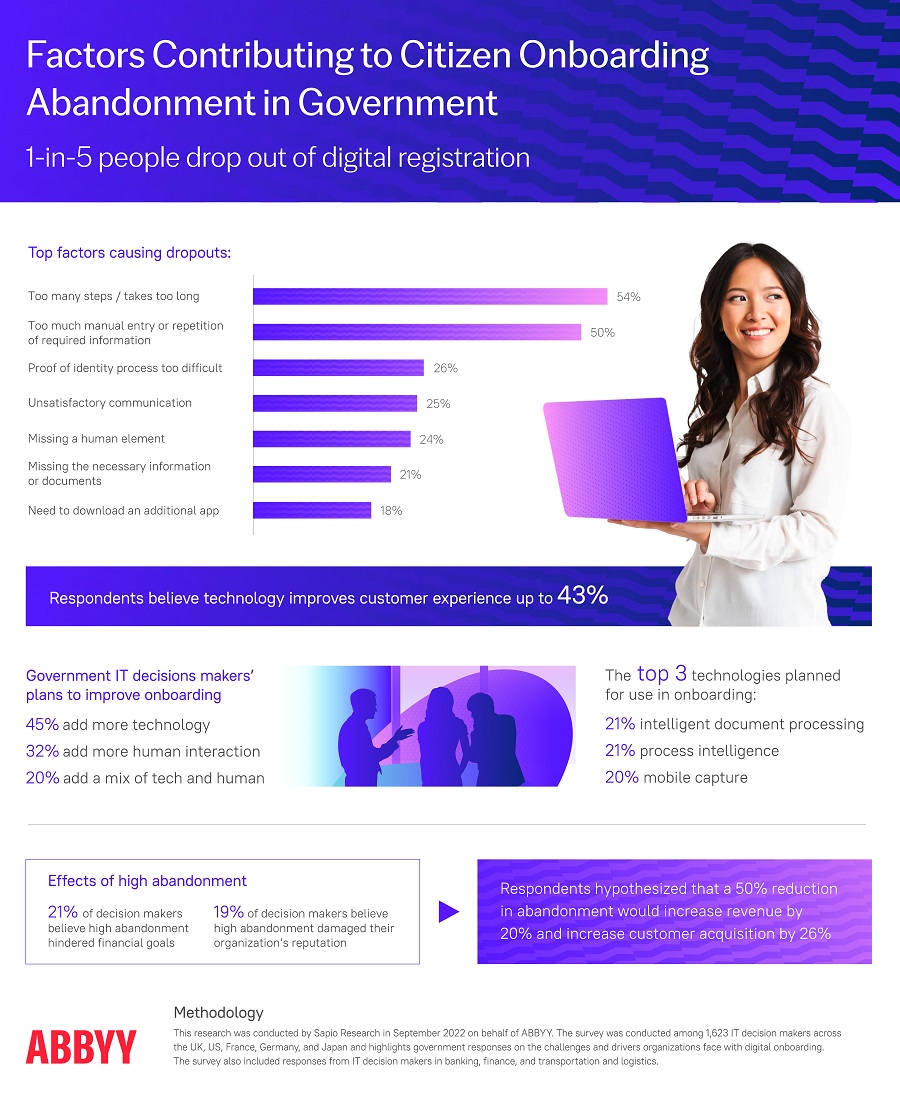Government IT Leaders Name Top Reasons Citizens Abandon Digital Onboarding, according to ABBYY Intelligent Automation Survey


A survey among government IT leaders highlights the top reasons driving one-in-five people to drop out of digitally registering (also referred to as onboarding) for services, as well as its impact on revenue and public perception.
The State of Intelligent Automation Report, Customer Onboarding Pain Points and Drivers survey was conducted by Sapio Research and commissioned by intelligent automation company ABBYY and reports that 21% of government IT decision makers believe high abandonment rates prevented their agency from achieving financial goals, while 19% said abandonment damaged their reputation.
The survey identified seven factors causing dropouts:
- Too many steps/takes too long (54%)
- Too much manual entry or repetition of required information (50%)
- Proof of identity process too difficult (26%)
- Unsatisfactory communication (25%)
- Missing a human element (24%)
- Missing the necessary information or documents (21%)
Online registration for government services has historically been susceptible to these factors, with federal platforms like ID.me being notoriously cumbersome and invasive. The more time-consuming and complex an onboarding process appears, the greater the risk of drop out.
However, government respondents believe a 50% reduction in abandonment rates would increase revenue by 20% and raise customer acquisition by 26%. 32% stated halving abandonment rates would “greatly improve” their organizations’ reputation, which is a key area for government agencies that already struggle with low consumer trust.

Solving the issue: The fine balance between technology and human interaction
45% of IT decision makers in the government sector said they plan to make changes to onboarding by adding technology to streamline and modify their current processes. In doing so, they believe it would dramatically improve overall customer experience by up to 43%. When it comes to choosing technologies to assist in improving the online onboarding experience, process intelligence (21%), intelligent document processing (21%), and mobile capture (20%) were among the top being planned.
Yet, it is evident that human interaction still plays a key role in onboarding for around a third of government agencies (32%) report they plan to add more human elements. 20% of government respondents said they’ve augmented their onboarding processes with a mix of tech and human interaction. Despite the rapid uptake of new technology since the pandemic, good customer experience is still about relationships, whether in person or online.
"When citizens are trying to perform crucial tasks like registering for new services and programs or obtaining legal identification, the last thing they need is an additional obstacle. With REAL ID requirements in 2025 inching closer, now is the time to future-proof how agencies engage with their constituents. Clearly the best kind of digital onboarding considers the fine balance between technology and human interaction. Investing in the right mix of the two will better streamline how citizens prove and affirm their identities by enabling them to submit supportive documents via mobile devices – this will dramatically improve the citizen experience and enable them to have access to services faster."
Bruce Orcutt, SVP of Product Marketing at ABBYY.
To learn more about the survey, download The State of Intelligent Automation Report, Drivers and Pain Point for Customer Onboarding. For information on how AI identity proofing is transforming government services, download the e-book How AI identity proofing is transforming government services (abbyy.com).
Methodology
This research was conducted by Sapio Research in September 2022 on behalf of ABBYY. The survey was conducted among 1,623 IT decision makers across the UK, US, France, Germany, and Japan and highlights government responses on the challenges and drivers organizations face with digital onboarding. The survey also included responses from IT decision makers in banking, finance, and transportation and logistics.
About ABBYY
ABBYY powers intelligent automation. We reimagine the way people work and how companies accelerate business by delivering the intelligence that fuels automation platforms. Our solutions transform enterprise data and empower you with the insights you need to work smarter and faster.
We help more than 10,000 companies globally, including many of the Fortune 500, to drive significant impact where it matters most: customer experience, profitability, and competitive advantage.
ABBYY is a US-based global company with offices in 14 countries. For more information, visit www.abbyy.com/company/about-us/ and follow us on LinkedIn, Twitter and Facebook.
ABBYY can either be a registered trademark or a trademark and can also be a logo, a company name (or part of it), or part of a product name of ABBYY group companies and may not be used without consent of its respective owners.
ABBYY Editorial Contact

